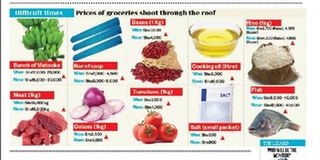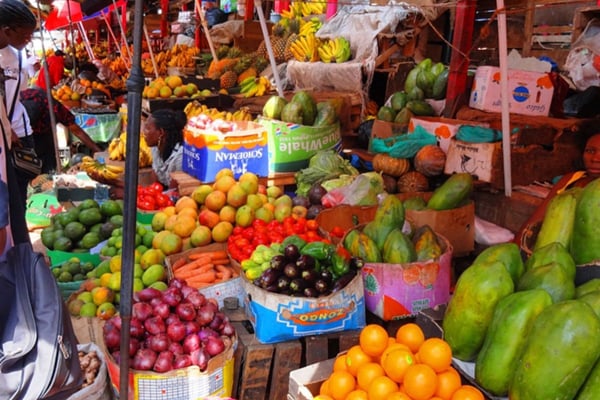Prime
Ugandans brace for hard times as commodity prices soar

Prices of groceries shoot through the roof
What you need to know:
- A survey by this newspaper shows that the trend started at the beginning of the year.
Commodity prices countrywide have been rising at a fast rate since January, forcing Ugandans to adjust their budgets in a country that is recovering from the devastating impact of the Covid-19 pandemic.
This means it now costs more to put food on the table and generally provide for a family.
Consumers have to dig deeper into their pockets to buy some of essential goods, whose prices are weighing on the economy’s economic recovery.
In Kampala City, a mini-survey conducted on commodity prices in the five divisions showed that items such as washing soap, Irish potatoes, maize flour, cooking oil, and matooke have more than doubled since January. The prices had stagnated during the same period in the year 2021.
A bar of soap, for instance, costs between Shs8,500 and Shs10,000, up from about Shs3,500 in January. A kilogramme of rice goes for between Shs4,500 and Shs5,000, depending on the type, up from Shs3,000, while that of maize flour (posho) has climbed to Shs3,000 from Shs1,500 in January.
A bunch of matooke now goes for about Shs40,000, up from around Shs15,000 as of January. Matooke and posho are some of the popular foods consumed by majority Ugandans.
Some of the vendors that this newspaper interviewed attributed the steady increase in prices of commodities to high transportation costs, last year’s dry spell that hit some parts of the country and high fuel prices.
“The price of a bunch of matooke is ranging between Shs15,000 and Shs40,000, depending on the size. During the dry season, matooke is scarce and also the high fuel prices have led to an increase in the transportation costs, hence pushing the prices up,” said Mr Ezra Kalyango, a matooke trader at Busega market in Kampala.
Ms Edith Mulokole, a matooke vendor at Banda market, cites high transportation costs that have left them with no other option but to push the prices up.
Ms Rose Nantale, a matooke dealer in Kireka market, said most of the food is being exported to Rwanda and Dubai ever since the economy was reopened, creating scarcity in Masaka and Mbarara.
Ms Yvonne Katureebe, a businesswoman in Bugolobi market, attributes the hike in prices to increased fuel prices, although she observes that every year towards Easter season, food prices are too high compared to the Christmas season
“As a result of high commodity prices, the prices of other household commodities such as sugar, rice, cooking oil, and rice have equally increased,” Ms Katureebe observes.

A porter offloads matooke from a truck in Kampala recently. Vendors attribute the rise in prices of commodities to high transportation costs, last year’s dry spell that hit some parts of the country and high fuel prices. PHOTO/FILE
Mr Robert Ssekidde, a dealer in perishables at Masaka Central Market, told Daily Monitor last Friday that because of the unstable fuel prices, truck operators have increased the price of transportation from the previous Shs700,000 to as much as Shs1.5 million for every truck leaving Ankole Sub-region for Masaka.
He said as a result, they have had to increase the price of matooke.
Mr Gerald Kirangwa, a trader operating from Kalangala Central Market, said the hike in fuel prices has had an effect on the prices for other commodities.
Mr James Ekaju, an Economics teacher at Usuk Secondary School in Katakwi District, said there are always no communications from manufacturers to consumers as to why prices are hiked.
“It gets sad when people wake up to blown up commodity prices they cannot do without,” he said.
The high soap prices are hurting the rural population.
In a place such as Amotom in Kapelebyong District, 88 kilometres from Soroti Town where retailers buy commodities, a bar of White Star soap was by last Friday going for Shs9,500.
Mr Joshua Mutekanga, the chairperson of Kabale Vendors and Traders Association, said the cost of hiring vehicles to transport 35 tonnes of maize flour or rice from Kampala to Kabale has been increased from Shs2m to Shs4m.
“It means the consumers have to shoulder the burden by incurring the hike in prices,” he said.
Mr Mutekanga added that for the commodity prices to drop, oil dealers should reduce fuel prices.
The Uganda Bureau of Statistics (Ubos) has said the increase in prices of commodities and services over the last 12 months ending February 2022, has pushed Uganda’s inflation to 3.2 percent, up from 2.7 percent registered in January.
Presenting the Consumer Price Index (CPI) in Kampala on February 28, Ubos officials observed that the rise in inflation was driven by the increase in prices of commodities under education services that increased by 9 percent, furnishings, household equipment and household consumables that went up by 9 percent.
Last week, while appearing before Parliament, Mr Henry Musasizi, the State minister for Finance, asked the House to grant him time to analyse the causes of inflation with his technical team and present a comprehensive statement on the matter.
Fuel prices blamed
Last month, government revealed that it had sorted out fuel supply challenges and that the pump prices would normalise.
However, nearly a month after the proclamation, pump prices are still above Shs5,000, which is an average increase of Shs400 from the price before the crisis hit the country at the close of 2021.
Mr Michael Wadenka, a vendor in Mbale Central Market, said they have no option but to price commodities highly because wholesalers have done the same.
Mr Robert Opio, a resident of Malaba Town Council, said they have resorted to buying cooking oil and soap from the Kenyan side.
“We cross over to buy soap and cooking oil because the Ugandan prices are far above what we locals can afford,” he said.
Traders in Karamoja Sub-region attribute increased commodity prices to hiked fuel prices and fear of insecurity as ambushes by cattle rustlers continue manifesting.
Wholesalers in Soroti dealing in soap, have put a condition on retailers; for each box of soap one buys, it must be accompanied by a jerrycan of cooking oil. Wholesales claim they have accumulated cooking oil, which is not being bought.
At Novo Enterprises Limited, a lead distributor of soap in the area, retailers who are only coming for soap are waved off.

A trader at her stall of fruits and vegetables in Mbarara Central Market last Friday. PHOTO/RAJAB MUKOMBOZI
The distributor said when they are receiving or buying consignment, they buy both soap and cooking oil, adding that allowing retailers to buy only soap kills their business.
Ms Phiona Paklaki, a wholesale dealer at Paklaki Investment Ltd, Gulu City, said suppliers such as Mukwano, Bidco and Mount Meru Uganda Ltd are supplying very limited quantities of washing soap. Ms Paklaki says a box of blue soap that sold at Shs45,000 (wholesale), shot up to Shs70,000 due to the scarcity and limited supply by manufacturers.
According to Mr Jackson Ogwang, a senior staff at Mt Meru Uganda Ltd, a soap manufacturing plant in Lira District, there have been significant challenges in importing raw materials.
“First of all, the trucks were held back recently due to Covid-19 testing conditions at the border in Malaba but after lifting that, there came again exorbitant taxes against the raw materials,” Mr Ogwang says.
Ms Annet Namudo, a trader in Nakasero market in Kampala City, said the high prices are pushing them out of business.
“In Kampala we don’t grow food crops. Most of the commodities are coming from villages and dealers are crying out over high fuel costs,” he said.
Effect of Russia-Ukraine war
The head of the World Food Programme, Mr David Beasley, has warned that the conflict in Ukraine could send global food prices soaring, with a catastrophic impact on the world’s poorest.
Ukraine and Russia are both major exporters of basic foodstuff and the war has already hit crop production, driving up prices. Mr Beasley said it was putting more people at risk of starvation worldwide.
Russia and Ukraine, once dubbed the breadbasket of Europe, export about a
Quarter of the world’s wheat and half of its
sunflower seeds and oil. Ukraine also sells a lot of maize globally.
Analysts have warned that war could impact the production of grains and even double global wheat prices.
Mr Beasley said the number of people facing starvation worldwide had already risen from 80 million to 276 million in four years prior to Russia’s invasion, due to what he calls a ‘‘perfect storm’’ of conflict, climate change and Covid-19.
Compiled by Simon Peter Emwamu, George Muron, Al Mahdi Ssenkabirwa, Sylvester Ssemugenyi, Jessica Sabano, Alex Ashaba, Irene Kirabo, Joel Kaguta, Robert Muhereza, Emmanuel Arineitwe, Felix Warom Okello, Felix Ainebyoona, Sheilla Mutesi, Rajab Mukombozi, Fred Wambede, Joseph Omollo, Steven Ariong, Phillip Wafula, Ronald Seebe, Abu Baker Kirunda, Tausi Nakato, Tobbias Jolly Owiny Priscilla Maloba, Karim Muyobo, Stephen Otage & Bill Oketch
READ MORE




